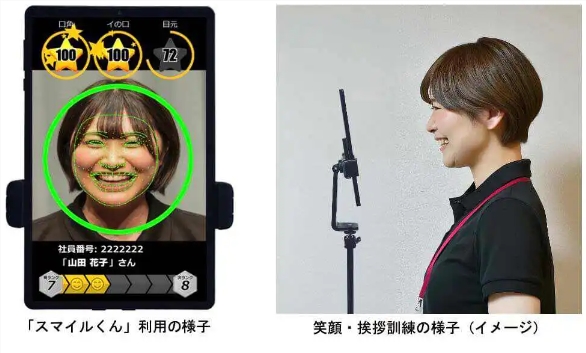Japan's Aeon Supermarket launched the AI system "Smile-Kun" to monitor employees' smiles, causing huge controversy. The system analyzes employees' facial expressions and voices to provide ratings and feedback on employee services, aiming to improve customer service quality. However, this move has raised public concerns about employee privacy and work pressure, as well as questions about the authenticity of employees' emotional expressions and the reasonableness of the work environment.
Today, in the pursuit of efficient and humane management, Aeon, a large supermarket chain in Japan, has caused widespread controversy in society for using AI technology to monitor the smiles of its employees.
On July 16, Yahoo Japan reported that Aeon has launched an AI system called "Smile-Kun" in 240 stores since July 1. The system aims to improve employees' customer service skills by analyzing their smiles and volume of voice and providing real-time feedback.

The Smile-Kun system requires employees to greet them every day and then rate them based on 450 smile points, including the eyes and mouth, out of 100. In addition, the system can analyze employees' volume, speaking fluency and tone in real time and provide optimization suggestions.
It is reported that AEON trialled the Smile-Kun system in eight stores last July for three months, with approximately 3,400 employees participating. According to feedback from undercover customers arranged by Aeon, after using Smile-Kun, the smiling ratio of employees has significantly increased by 1.6 times.

Aeon believes that Smile-Kun can conduct employee training in a game-like manner and reduce the boring feeling of daily training. At the same time, the use of AI to track and assess employee performance in real time can help accurately issue bonuses, thereby improving employees' work enthusiasm.
However, most netizens opposed this. They believe that employees' smiling conditions should vary from person to person. For those employees who do not like to smile by nature, it would be more reasonable to use qualitative assessments from superiors or colleagues. Some netizens are worried that if all they see when going to Aeon are employees who are forced to smile, it will be difficult to leave a positive impression.
Although this approach of Aeon Supermarket is based on the good intention of improving service quality, it ignores the authenticity of employees' personalities and emotional expressions. While pursuing efficiency, how to take into account the feelings and dignity of employees is a question that business managers need to think deeply about.
Aeon's "Smile-Kun" incident has triggered extensive discussions about technology ethics and humane management. When companies apply AI technology, they need to carefully weigh the relationship between efficiency and employee well-being to avoid technology becoming a tool to oppress employees. In the future, how to balance technological progress and humanistic care will be a challenge faced by both enterprises and society.